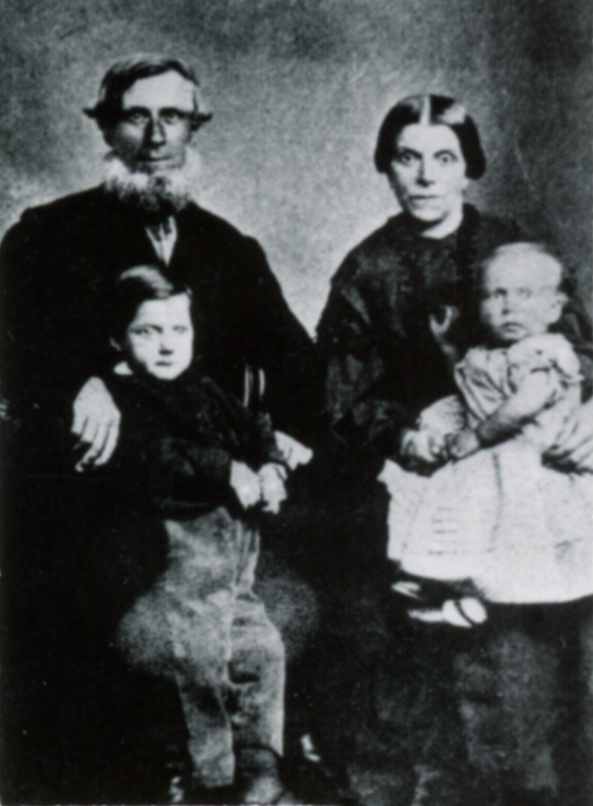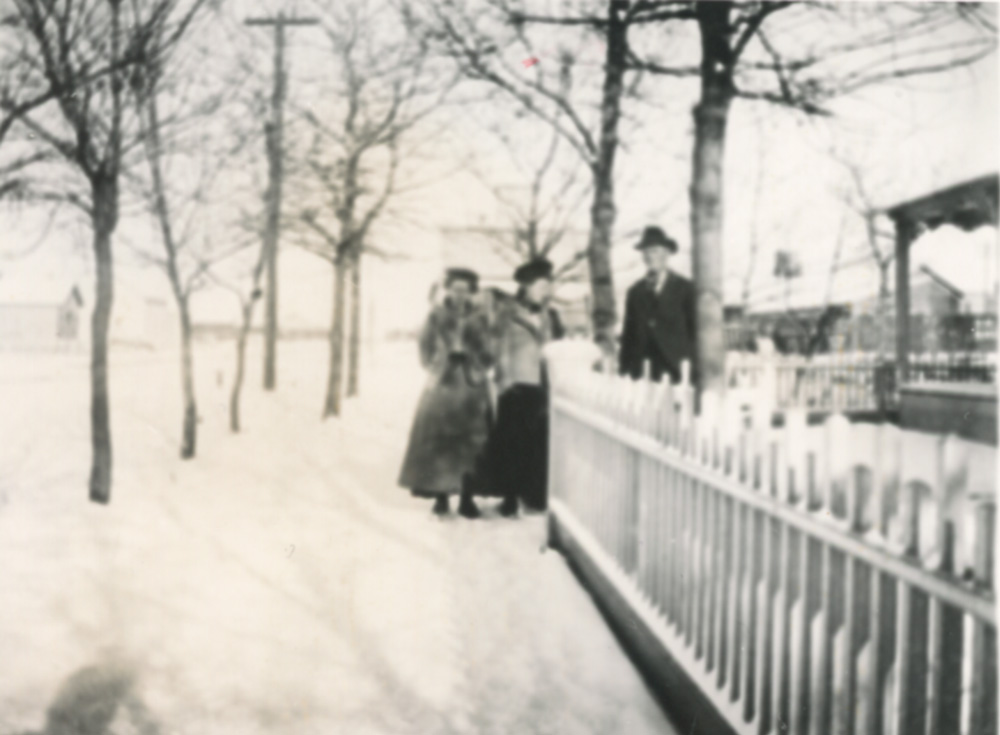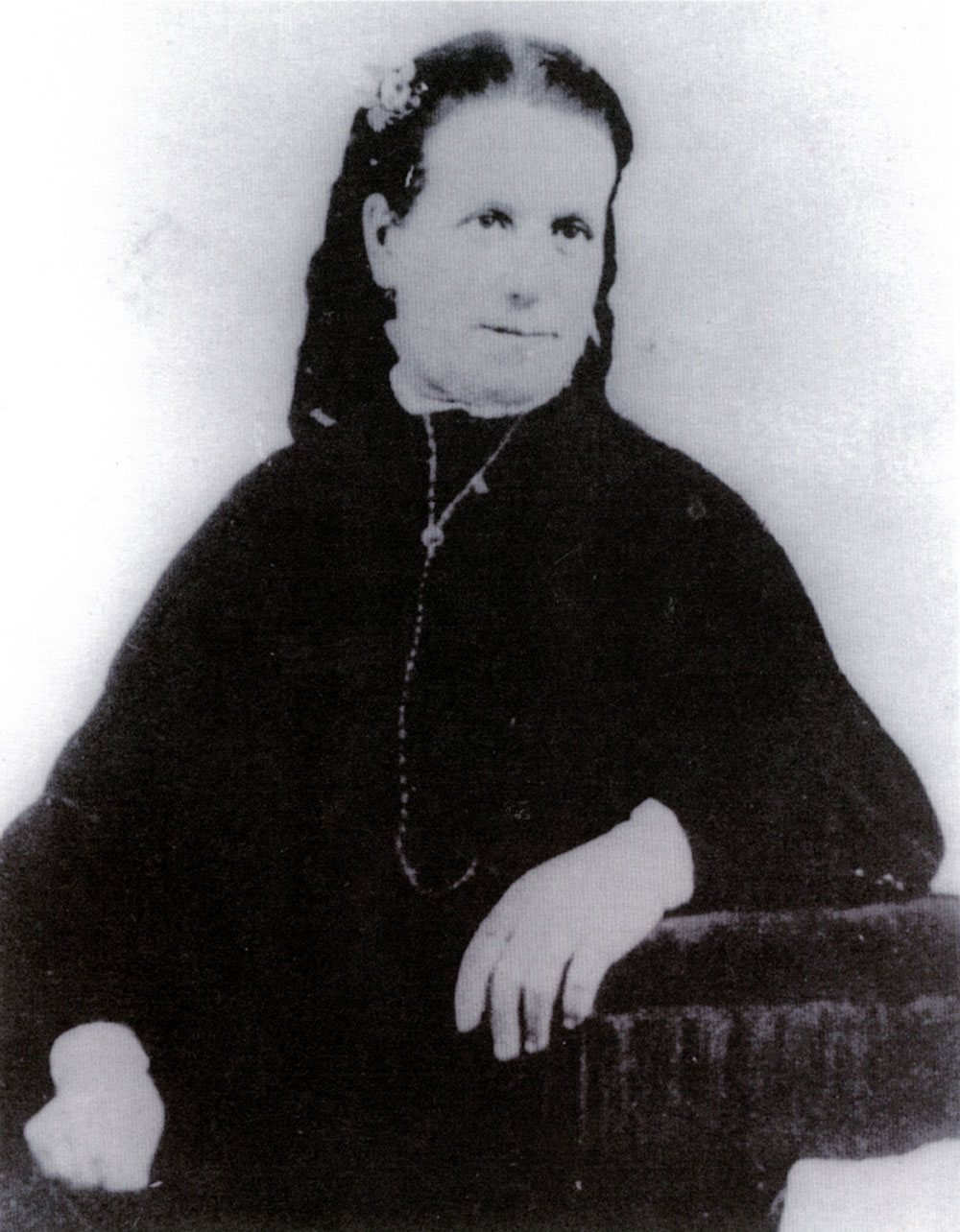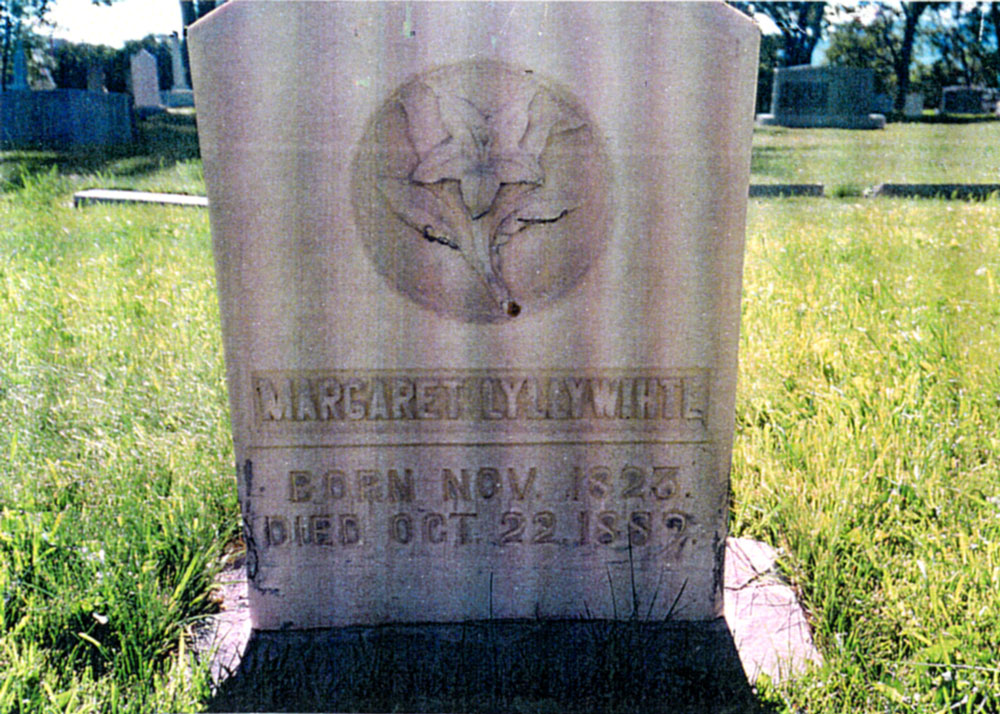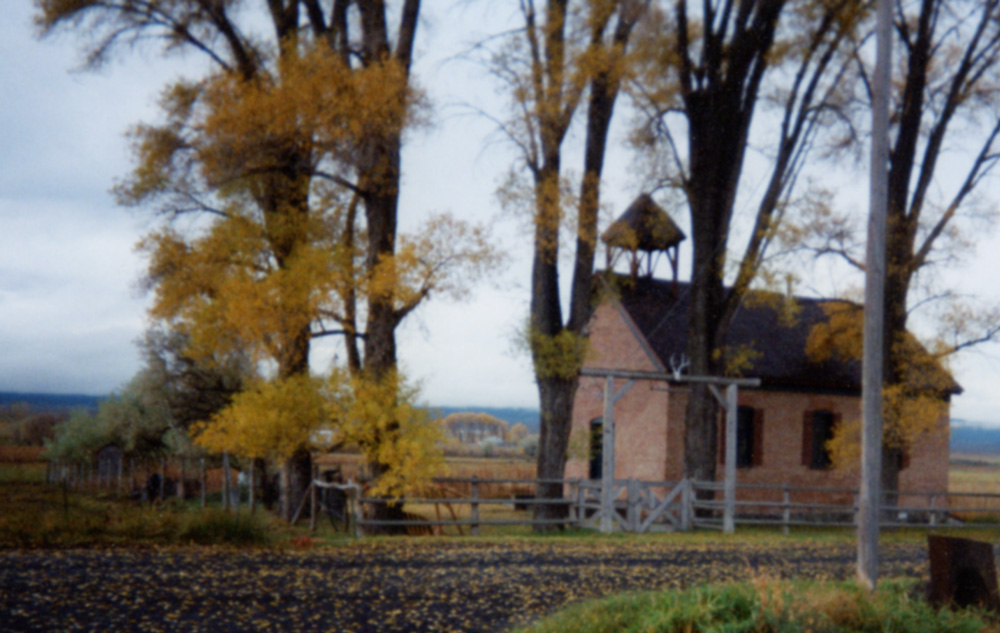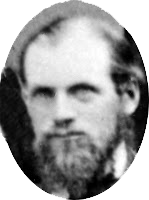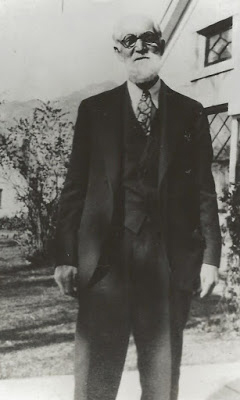John Swindlehurst
Dorothy’s Great Great Grandfather
Life Sketch of John Swindlehurst
by Matilda Orwin Lillywhite
John Swindlehurst was born October 25, 1812, at Dunsap Bridge, Slaidburn. His mother, Isabel. Lancaster, was born in 1792. They were married at Slaidburn in 1811. This couple had eleven children and John was the oldest. His father was a blacksmith and trained all of his boys in this work. It was a very profitable business in England at that time. There were so many cloth factories at that time that some of the machinery was always needing repairs to keep them operating.
Sickness in the Family
In the family of James and Isabel Swindlehurst there was a good deal of sickness. James, the next boy after John, bumped his knee and a white swelling developed. He was an invalid for a number of years. Finally his leg was amputated but he died. Our mother remembers this boy walking on crutches. Then three brothers died of consumption in two years. They were George, Abraham, and Jonathan. They were a great care and worry to their parents. The girls were young and the mother overworked. Six years after the boys died, the mother died of consumption in 1846.
Septimus Swindlehurst married an Irish woman, Johanna Synch. My mother remembers seeing her step-dancing on the table.
LDS Baptism
On January 20, 1833, John Swindlehurst and Margaret Hopwood were married at Slaidburn Church. Margaret was the daughter of Robert and Ellen Hopwood, formerly of Newton. John and Margaret lived first at Newton and here their son Robert Hopwood Swindlehurst was born. Then they moved to Preston and it was here they heard the Gospel. Heber C. Kimble and Orson Hyde had hired a “cock-pit" or theatre where roosters used to fight for amusement. These Elders used the building to hold their meetings. The Elders were protected by the officers in this building. They also held meetings in the a market place in Preston.
Grandfather told my mother that he could hardly eat or sleep from one meeting to the other after he heard the gospel. His folks didn't think much of it, and thought he was foolish. But he knew it was true at first. He was baptized in 1838. The first baptisms in England were in 1837, so he was among the first. His wife was probably baptized too, but we have no record of it.
At Preston five more children were born, one of whom was Aunt Ellen, as we all called her. She grew to maturity, the other children died when small. Later they moved to Hashingden and two more children were born, one John Jr. Then they were sick and one died leaving little John. A short time after this his mother died leaving Grandfather with Ellen and John.
Moving to Zion
Four months later he married my Grandmother, Matilda Rothwell, and she took care of the two children. She got along really well with Ellen, but John was a great deal of trouble. Her four girls remember what a great trial their brother John was. When he was fifteen, Grandfather decided to send him to Zion with Matilda's mother. Grandma Barnes was sick all the way across the ocean and across the plains and died soon after reaching Utah. Her two daughters had no money and went out to work in polygamy families and married there. So John was left alone. He wrote very little to his father and was soon lost track of. After the family came to Beaver, he came through a few times and then spent one winter with his father but was finally lost track of. Now none of the family knows anything about him.
Grandfather and Grandmother lived on a rented farm shortly after their marriage. Grandfather's work was at the factories and he was away a good deal. His father, James Swindlehurst, lived with them and he and grandmother managed the farm. This place was called "Tops" farm. My mother and her sisters remember their Grandfather. He came to Beaver and died and was buried there.
After Mother's grandfather, James Swindlehurst died, they moved to a small farm. Here the John Swindlehurst’s first boy was born, named William. When going to work, he would carry the baby part way, grandfather thought so much of him. When he was about a year old he was taken very sick. Jane Riley was staying with grandmother and she left her with the baby while she went for the Elders. When she got back the baby was dead. Grandmother felt very badly and asked John Taylor to go and tell Grandfather. When Brother Taylor told him of the baby's death he said he felt like punching John Taylor's head all the way home he was so shocked.
Uncle Edwin was born June 28, 1846, at Slake Leversy, Blackburn, England. Thomas was born March 20, 1867 at the sane place. When Thomas was a year old the Swindlehursts decided to leave England and come to the United States and Utah. They left Liverpool, England, July 15, 1868. This is grandmother's birthday. My mother, Isabel, was 15 and Sophia was 13, Sharlottie was 11, Amelia 9, Edwin was 4, and Thomas one year. Their ship was called the "Colorado," and they were 13 days on the water. They were steerage passengers and they all had to go up on deck every day.
Grandfather was really sick all the way over. Had to have two men take him out for fresh air every day. The rest of the party were well. They had hard sour biscuits to eat, but could hardly get their teeth in them.
Crossing the Plains
They landed in New York at Castle Gardens and then cane to Laramie by train. Here they got ox teams to cross the plains. There were six oxen and thirteen people to each wagon. John Swindlehurst, his wife, four girls (Aunt Ellen had married and stayed in England), and two boys, Mary Harris, her father, step—mother and one child and the teamster, Fred Limb. He had gone back to Laramie to bring the saints to Utah. All their belongings were put in the wagon. All the folks walked when able, if not were given a little ride. They all walked most of the way. The older children walked all the way and thoroughly enjoyed it. Crossing the plains was a real pleasure trip for them. They walked ahead of the wagons and in the afternoon, about 4 o'clock, they would pick up buffalo chips in their aprons to make fires with at night.
It was a happy, care-free time for the girls, but not for their parents. They were the last wagon one day, the middle one next day, and the lead one the next. Thus the wagons changed places. After camp was made and supper over, they rubbed the skillet lids together and the people collected, and sang hymns and talked and said prayers. Sometimes dancing was participated in before they went to bed. Then up early next morning to start out again.
Settling in Beaver
In England some friends had talked together and all decided to go to Beaver, and all make their home there. A factory was being built in Beaver and they were all factory workers. So decided they would go to Beaver. There were a John Robinsons, Harry Tattersalls, Duckworth Grimshaws, and the Swindlehursts. I, Matilda Orwin Lillywhite, the oldest granddaughter of John Swindlehurst, was raised among the above families' children and remember all the men and women.
One man, Brother Howarth said, “Now, Brother Swindlehurst, you be sure and go to Beaver." So they all went to Beaver, but Brother Howarth didn't come. He stayed in Salt Lake City.
When the Swindlehursts came to Salt Lake City, they camped at the tithing office. It was located where the Hotel Utah is now. Grandmother's sister, Ellen Brain, and her husband, were in Salt Lake and they had a lumber home partly built for the Swindlehursts, but they were set for Beaver and left at once. They arrived in Beaver Saturday night and Grandmother used the last flour. When mother got up her mother was sitting on the wagon tongue crying, and her father was gone. Presently he came and said, "Ah, Lass, what art thou crying for?" "Well, I think I have plenty to cry about. They have come for the wagon and I have no place to go."
"Ah, but I've got a place," he said. I have rented a carpenter shop, belonging to Elliot Wilden on the lot where Amelia now lives; and they moved there. Later rented and then bought a place where Uncle Edwin now lives. They began at once to fix up the place. Brothers Ebenezer Gillis made the chairs, Johnathan Crosby made a bedstead, Grandfather made benches and a buffets. They used a carpenter's bench for a table, while they lived in the carpenter shop.
Grandfather had saved up his money and had plenty to come to Utah with. He lent money to George Riley to come to Utah with. Richard Benson, a missionary, handled the funds. After the trip he had some of Grandfather's money left but did not return it. He said that he thought he ought to have it for the trouble. The house they bought had two long rooms on the east and two adobe rooms on the west. They were quite comfortable there.
It had a dirt roof and leaked when it stormed. At one time my mother was trying to fix the leak in the roof and was struck with lightning. It knocked her down and twisted her face. Her father administered to her and she was soon all right.
Grandmother hired a loom and they bought wool, cleaned it, corded it, and wove cloth from it for their own clothing. They also made some for the people that owned the loom. Our mother had learned how to weave cloth in England. Grandfather Swindlehurst built a blacksmith shop on the southeast corner of his lot, and worked steadily at his trade and did well. Although he didn't get money for his work. Most everyone traded work or got produce in exchange.
When the woolen mills were completed, my mother was one of the first weavers. They only received part money for their wages and the rest in script which would buy yarn, blankets, etc. at the woolen mills. My mother's name is on the Pioneer Plaque as one of the first weavers in Beaver Woolen Mills.
Mother and her three sisters were very good singers; two sang alto and two sang soprano. Soon after the Swindlehurst family arrived in Beaver from England, Brother Thomas, their choir leader, invited Mother and her older sister Sophia to join the choir. When they went he asked them to sing a hymn, which they did. He clapped his hands and said, "Now we have an alto singer.” Until then mother knew she sang different but not the name of her part. Grandfather always had his family sing some hymns before prayers at night. My mother and her sisters spent a lot of time singing at various places, in church and other public meetings. As a small child I loved to listen to mother and her three sisters sing at home gatherings. It was beautiful. Their favorite song or mine rather was, "Life is Not Always Pleasure" and “Stay on the Farm.”
Grandmother was a very skilled sewer, both in dressmaking and tailoring. She never had a sewing machine. I remember a cape and nightcap she made by hand. The stitches were as small and even as if done by machine. They were beautifully even. She did all the sewing for her family by hand while her girls worked at the mills.
Sealed in the Endowment House
In 1870 the Swindlehursts with a Brother Roberts drove oxen teams to Salt Lake Endowment house and had their endowments and sealings done. They took their daughter Sharlottie to care for the children.
The next year, June 20, their son Joseph was born in Beaver. When the baby was four years old, the Swindlehursts decided to build a better home. The excavation was made when one afternoon, Sidney Tanner brought a load of hay they had bought. Grandmother walked out to the barn to look at it and suddenly Grandmother slumped in the hay. They carried her to the house, she had had a stroke. It affected her speech and one side of her was paralyzed. She got so she could walk a little with some help. This was in February and she lived until October and took another stroke and died. She was only 45 years old. This was on October 19, 1875.
My mother married Jesse Orwin on the 24 of July 1873, in Beaver City. She had to continue working at the mills until she taught her sister to take her place at the loom. Mother lost her mother two years after she was married. She missed her mother very badly. She had always worked in the mills and hadn’t learned sewing or how to keep house. Her sewing was such a worry and made her very determined to see that her girls were better prepared to keep house and sew than she. Which she lived to see realized.
My father, Jesse Orwin, was away from home working much of the time. Mother surely appreciated living close to her father for she had very poor health for many years. Many nights my brother Jesse and I would make hot poultices and keep on Mother all night, she telling us what to do. Father was away at the mines.
Family Life
Mother and Father were blessed with three boys and three girls. They are: Jesse Orwin Jr., born June 2, 1874, died September 25, 1920; Matilda Orwin, born March 13, 1876; John James Orwin, born August 19, 1860, died December 29, 1947; Sarah Orwin, born January 12, 1885; Lottie Orwin, born January 7, 1888, died September 10, 1930; Warren S. Orwin, born January 13, 1896, died October 13, 1932. All were born in Beaver, Utah.
Father built us a nice comfortable home and he had a good sized farm. But in Beaver the water was scarce in the late summer and crops would burn up and some years the rabbits took a large share of the crops. Prices were low, so Father would go to Frisco to the mines for a few months. Mother would have the care of we children alone and poor health. She didn’t have washers, sweepers, and all the lovely conveniences we have now. Not even electric lights. Cleaning the lamp globes was my job when a very little girl. I started washing them when about 12 years old and on the washboard, no washers. That year I learned to knit, wasn’t I proud? Mother would knit one stocking and I the other. For Christmas I knit my two brothers a pair of mittens. Mother was very proud of me. Then I learned to make button holes that year. Mother appreciated this help in her sewing for there was many to do on waist dresses and shirts for we didn’t or couldn’t buy them ready made. This was the year we lived on the farm, and my youngest sister Lottie was born. Father would grub the sage brush and my brothers piled the brush high and then we would burn it at night. We had great times.
Father always wanted to move up in the northern part of Utah. Mother wouldn't move as long as her father lived. He died April 22, 1889 of ailments due to his old age. It was beautiful to see the devotion and unity that existed in the Swindlehurst family.
Bear River Valley
The winter of 1895 and 1896 my Father came up to the Bear River Valley and bought a farm and built a house. The valley was new, having just taken out water from Bear River, into canals for irrigation purposes. Again Father and Mother, the boys and girls did some real pioneering. Father and my brothers Jesse and John came a few months before the rest of the family and located in Riverside. Mother with a six months old baby and we three girls left Beaver July 1, 1896. There was very few people in Riverside, it took them all to hold Sunday school and meeting. They had no organ in the school house where such gatherings were held. The roads were poor, muddy in wet weather and dusty in summer.
The land was very fertile and plenty of water but wheat was 30 cents a bushel. At that price a family of eight took many bushels of wheat to clothe and feed them. Everyone was as one family in the ward, working in everything put on by the public. We had good times together. My brothers and Father worked hard and we lived in the valley to see many changes. Electricity put through the valley. A sugar factory built; good roads; churches and schools.
Move to Provo
About 1903 Father leased his home and farm and moved to Provo, putting my sisters, Sadie and Lottie, in the B.Y. College. He built a lovely modern home and they really enjoyed it there. Although Mother always wished she cold have such conveniences when her children were home and all small. She loved Provo and her good friends and the many privileges the college provided them.
My two sisters graduated from the Brigham Young College. Father too enjoyed his home. Father and Father were faithful Latter Day Saints. Mother paid her tithing if it took the last cent she had. She was a beautiful type of modesty and refinement. Although she hadn't attended school very much, she was cultured in the art of housekeeping and was a perfect bread maker. As she said, she surely taught her daughters to do every task in home building and especially saw that we learned to sew. Her home and family was her Heaven. She died on the operating table in Provo Hospital of kidney stones. She died on September 26, 1913. We lost the truest of Latter Day Saint Mothers and chums.
After mother died, father leased and sold the farm and he and my brother John went out in Nevada for a while and cared for cattle. Father's health was poor and he gave that up. After Mother died my sisters kept house for father, Sadie teaching school and Lottie teaching sewing. He later went to Los Angeles where he died of Bright's Disease in the Los Angeles Hospital. I went there and took care of him for a month. He died June 11, 1918.
Father was a very hard worker. He was a good miner and fine judgment in ores. His word was as good as his note. He always provided a good home for us and was proud of the home and surroundings and family. His mother died when he was only three years old and his father raised him practically.
